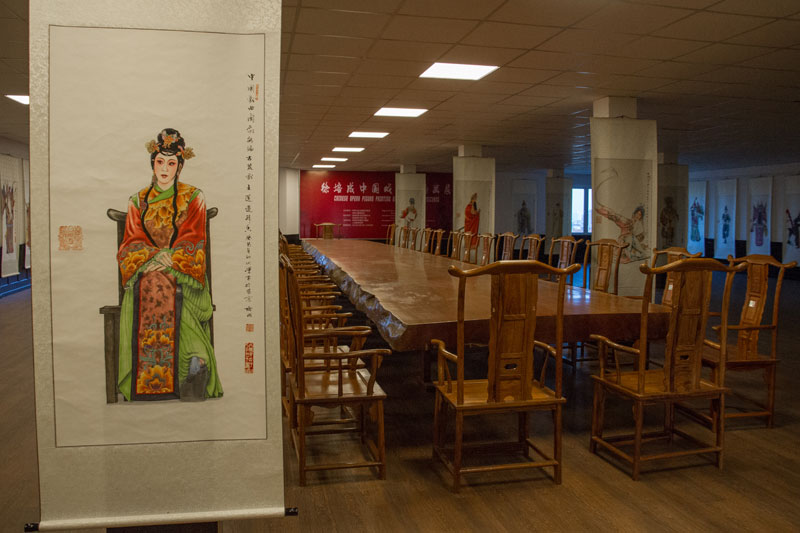When China’s first “Cultural Mansion” on foreign soil opened last week in Phnom Penh, Chinese state media heralded it as a vital tool to help bring Cambodian and Chinese citizens together.
“The Chinese Cultural Mansion in Cambodia is the first mansion China has opened overseas,” Chinese Vice Minister of Culture Dong Wei said at the opening ceremony, according to a report in Xinhua, China’s state-run news agency.

“It is aimed at promoting Chinese culture in Cambodia,” he added.
But sitting just off a dusty thoroughfare in Tuol Kok district, the “mansion” is housed in a nondescript eight-story building that looks more like a run-down hotel than a shining symbol of Chinese culture.
The mansion occupies three stories above the Chinese-owned Xinzhi Bookstore and Zhonghua International School, which offers Chinese, Singaporean and Cambodian curriculum to students from about eight countries, said Zu Lihua, the school’s owner and headmaster.
When reporters visited the building last week, Ms. Lihua reluctantly allowed a cashier to give a tour of the mansion.
The first floor featured a large, empty and undecorated room with three ping-pong tables. Down an unadorned hallway were two smaller rooms, one with a few pieces of exercise equipment, and the other with rows of tables with wooden sets of Chinese chess placed on top.
The floor was empty of visitors.
“Not so many people come here,” said Chum Nimol, the Cambodian cashier. “Nobody knows about it.”
The second floor was more impressive. A 4-meter-long table fashioned out of a single piece of wood formed the centerpiece, while scrolls decorated with Chinese characters and traditional paintings hung from the walls.
Several minutes into the tour, Ms. Lihua and another Chinese manager burst nervously into the room. While speaking hurriedly on the phone, Ms. Lihua told reporters they had to leave and could come back the following week.
“This is a Chinese center, we have to be careful,” she said. “We cannot tell more.”
On Tuesday, Liu Minhui, the general manager of the bookstore, which is owned by Chinese businessman Li Yong, who also owns the mansion upstairs, was much more welcoming. He asked an employee to give a tour of the elaborately decorated teahouse on the third floor of the mansion.
Sitting in his office on the top floor of the building while chain-smoking Chinese-brand cigarettes, Mr. Minhui explained that the cultural mansion was providing something Cambodians desperately want.
“Because China is getting more developed and extending its power, Cambodians want to learn more about the country and language,” he said.
“It is good for Cambodians,” he added. “They can get jobs with Chinese companies and help develop the country.”
Cheng Hong Bo, a spokesman for the Chinese Embassy, said last week that the embassy provided support to the mansion, but would not elaborate.
“All around the world the Chinese government has been planning to establish Chinese cultural centers and the mansion is another form,” Mr. Hong Bo said Tuesday.
As China has in recent years increased loans and aid to Cambodia, and sought to strengthen military and trade ties, its use of soft power—promoting Chinese education, entertainment and arts—has also been swiftly rising.
The Confucius Institute, funded by Beijing, opened in Phnom Penh in 2009 to educate Cambodians about the Chinese language and culture. As of June 2013, there were 13 branches of the Institute across the country, with plans to build a school in all 24 provinces.
In August, the Chinese government announced it would provide 72 scholarships to Cambodian students to study at Chinese universities.
China’s soft power has even spread to children’s television programs, with state-run TVK planning to air a Chinese-produced, 26-part cartoon series designed to provide “education through entertainment to Cambodian children,” according to state news service Agence Kampuchea Presse.
Sok Touch, a political analyst and president of Khemerak University, said Wednesday that China’s push to promote its culture in Cambodia benefits both countries.
“China has no place to stand in Asean, so they need Cambodia,” he said. “[T]hey want Cambodia to monitor the presence of the west in Asia.
“Another reason is…the economic value—we think it is good for Cambodian students to study Chinese so that they can work for Chinese companies, as China has [a] big population.”




